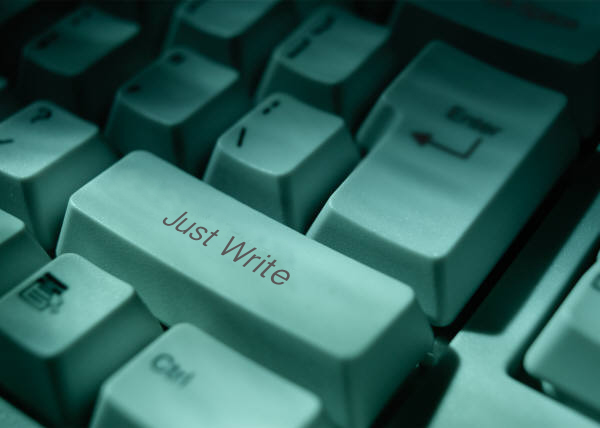
by Jenna | Mar 20, 2013 | Writing Articles
One of the greatest bugaboos of writers (and creatives of all sorts) is resistance.
Ah, resistance.
Resistance is that unseen force that repels us from writing (or eating our vegetables or doing other good things we know will move us forward in our lives). We’ve talked about resistance here before, including why we procrastinate, especially about the stuff that really matters.
I often talk with writers about the ways to face and battle resistance — it’s something that must be overcome pretty much every day, in order to sit down to write. (Or floss. Or exercise. Or take your vitamins. Or keep your resolutions.)
One of the very best antidotes to resistance is creating a solid writing habit. (Just like a habit of going to the gym makes is so much easier to keep going.) Once you’ve got the habit in place, you stop thinking about it, and you just do the work.
But resistance is tricky!
One of my community members mentioned the insidious nature of resistance, and how sneaky it is. I was instantly reminded of a story that illustrates resistance all too well and posted it on our forums for our participants. I thought you might like to see it too.

In one of my favorite fantasy books, Seventh Son by Orson Scott Card (part of his excellent series, The Tales of Alvin Maker), there’s a scene that I think describes how resistance operates very well. Keep in mind that it operates in a positive way in this story, at least from the protagonist’s point of view, but from the antagonist’s point of view, it thwarts him to no end.
Here’s the scene:
Alvin is a young boy with innate magic abilities, a force for good in the world, and a natural “Maker” — someone with a knack or talent for making things. Reverend Thrower, the local preacher deeply opposed to the folk magic Alvin practices in his community, has been instructed to kill Alvin by the “Unmaker.” When Alvin is injured, Thrower is asked to perform a surgery on Alvin’s leg, and Thrower sees his chance. He goes into the room where Alvin is resting to do the surgery with a knife and bone saw, with the intent to kill Alvin with the tools.
But when he gets into the room, he realizes that he’s left the tools outside the room. So he goes to get them. And then goes back into the room. And realizes that he’s left the knife and saw outside. Again. And then it happens again, even with other people trying to go and bring the tools into the room. Somehow this force of resistance simply will not allow Thrower, the knife, and the saw to be simultaneously in the room in Alvin’s presence. And it keeps happening, endlessly, until somehow Reverend Thrower finds himself a half-mile away from the house, walking away from it.

Now again, I realize, this is a positive kind of resistance, because it’s a benevolent force protecting Alvin’s life from Thrower.
But at the same time, I have always been mesmerized by the notion of this man who is so determined to do something, but an unseen force acts against him repeatedly, despite the strength of his intention and will.
This is how I see resistance to writing. An unseen force that will do whatever it can, trick us however it may, into “staying out of the room” or not sitting down to write, as if somehow butts in seats and fingers on keyboards are mutually repellant forces.
Vigilance is required.
The force of resistance must be met anew every single day.
This is why I keep writing every day, pretty much, and doing it early, because it’s SO MUCH EASIER than having to think about it and wrestle my way through the mountain of resistance and procrastination and guilt and shame that comes up when I wait to do it later in the day.
Everyone I talk to about how I get up to write early thinks I’m so disciplined and determined, and it’s true in some ways, I am.
But — think what you will — to me it feels like I am taking the easy way out. I know that sounds crazy. But I feel it inside me, that writing early, having that regular habit, actually makes it easier to keep doing it than it is to stop, and so much of the daily struggle over when I will write or will I write or how long am I waiting to write, etc., it’s just gone.
Gone.
Warmly,


by Jenna | Mar 6, 2013 | Writing Articles
I spoke with a sister writer yesterday and we talked about the many, many challenges we face when it comes to completing projects, let alone getting them out there into the world.
As moms and working women, we said, there’s always so much that has to be done, so many dishes to wash, noses to wipe, and deadlines to meet. Then if you start factoring in other people’s needs and wants (especially when you put them first) it’s all too easy to let your precious soul’s work slip to the bottom of the pile.
I’ll get to it later
If you’re like most people, you’re probably going through the day thinking that you’ll get to it later — whatever your “it” is, that creative work you’re endlessly postponing for another day, whether it’s writing or painting or drawing or finally getting the word out about your work — but that later never comes.
Or maybe you’ve promised yourself that you’ll work at the end of the day, but quite frankly, you’re exhausted.
The trap
The trap is that you’re aiming to clear the decks first, thinking your brain will finally have the space it needs for the creative work.
You figure you’ve got to get to Inbox Zero or handle all those administrative tasks or answer so-and-so’s Very Important Message first. Then you’ll be able to focus.
But.
Those things are like tribbles from Star Trek. They multiply at an exponential rate of growth, and if you persist in putting them first? They will literally devour your time.
And right now, you are letting them do that.
It’s time to stop.
How?
Let’s face it. Life happens. Life can be busy. It doesn’t have to be, but it often is, in this culture, in this era.
There will always be more email.
There will always be more to do. More information. “Opportunities.”
And we get to choose how we respond to that stuff, or not.
Do you want to organize your life around it?
Or do you want to organize your life around what is most sacred to you?
Your deepest, soul-level priorities.
What does that even look like?
For me, that is my writing and my family, period.
So guess how I spend my mornings?
I wake up, and I snuggle with my son. When we feel ready, he goes to play with his dad and have breakfast while I write for 30 minutes. It’s not a huge amount of time, true, but I do it 6 days a week.
I’ve also corralled my business, for the most part, into regular, day time hours. Rarely does it spill over into the night or onto the weekends. Why? So I can be with my family in the evenings and focus on my son.
Doesn’t mean my life isn’t hectic. Doesn’t mean there aren’t still things I want to change. But I’m working on them incrementally, moving them to the place I want them to be. Just like a writing project, bit by bit.
The key
The key to all this comes from a few simple notions.
1. Your creative work is what you were put here to do and is therefore of the utmost importance to you, your life, and your soul’s fulfillment (and even as a role model for your kids).
2. In order to fulfill that work, you must design your life around it and make sure its priority level is reflected in the day-to-day choices you are making. (I can help you with this in 1:1 coaching.)
3. Then you must protect that sacred work time — I call mine my sacred writing time — like your life depends on it. It does.
Warmly,


by Jenna | Feb 27, 2013 | Writing Articles
I’ve finished the rewrite of my script.
And I’ve learned so much about endings as I’ve approached this one. It’s a different scenario from the usual drill of having a forced, external deadline. This one has been entirely internally motivated. There’s no due date, there’s no have-to.
Look at the pony show
And the fancy tricks I started to pull at the end were very creative. Hilarious, in point of fact.
As soon as I could “see” the end — when I had it in my sights and knew it was only a matter of about 10 to 15 pages to get there, my insides got all squirrely. I decided I wanted to finish it right then, even if it took me the rest of the day.
When reality struck and I realized I had other work that had to come first (I am running a business here), I found myself wanting to postpone working on it again until I had a Long Block of Time to write (the precise opposite of what I recommend). What a joke! I got myself back onto my regular, moderate, well-paced schedule of 30 minutes a day pretty quickly once I caught on to the dog-and-pony show my inner critic was putting on.
I also found that my inner critic fired up a whole new level of criticism — she’s been pulling out all the stops, laying it on fast and thick, “It’s not as good as the last draft. You’ve wasted your time, it’s still no better. This still isn’t marketable.”
Good thing I know better than to listen to all that.
Creative expression is deeply vulnerable
Here’s what I also know to be true — part of me IS scared, and that’s okay. I just can’t — and won’t — let it stop me. I only need to acknowledge it and move on. It’s a big deal, after all, bringing something into being. It’s bound to stir up fear and vulnerability.
Shame researcher Brené Brown says that there’s nothing more vulnerable than creating something that has never existed before.
She’s right.
I’ve also heard it described as being like taking down your pants, in public, very… very… slowly.
It’s no wonder so many of us hesitate when it comes to completing our work.
It’s all about the fear — and the old wounds
So many of us have been so wounded around our creative expression, it’s no wonder we hold back when it comes to “shipping.”
Shipping, in case you’re wondering, means completing and delivering our work, whether it’s a website, book, ebook, script, painting, or widget.
I can’t tell you how many people I see never shipping their work, full of excuses, not realizing it’s really fear that’s stopping them. (If you want help keeping your fear and doubt from stopping you, my new mentoring programs will help. More on that next week.)
It happens with so many different kinds of projects — getting almost to the completion point and then deciding we’re “stuck” or “bored.” Websites that never go live. Ebooks that never get published. Scripts that languish in endless revisions.
It’s all just smoke and mirrors
Stuck is a smokescreen for fear.
Bored is a smokescreen for fear.
The fact is, we are terrified. Getting to the end of a project stirs up all our issues around being seen, heard, scrutinized, read, listened to, failing, succeeding.
But in the end, isn’t it better to try?
Brené Brown brought this quote from Theodore Roosevelt to my attention, “It is not the critic who counts. It is not the man who sits and points out how the doer of deeds could have done things better and how he falls and stumbles. The credit goes to the man in the arena whose face is marred with dust and blood and sweat. But when he’s in the arena, at best he wins, and at worst he loses, but when he fails, when he loses, he does so daring greatly.”
I’d much rather try and “fail” then never to try at all.
Warmly,


by Jenna | Feb 20, 2013 | Writing Articles
Back in November 2011, I wrote a post about why I’ve been getting up at 6 a.m. to write. It’s something I often encourage writers to try, especially those that are struggling with resistance and / or struggling to find time to write.
In my writing community, one of our writers found a study showing that your optimal creative time may actually be the opposite of your peak cognitive time. It’s sparked quite the discussion and has inspired some of our members to give morning writing a try. I have it in my mind to write a guide to morning writing, and I thought I’d start off with an article about it first.
The basic principle
The basic principle of writing first thing in the morning is that it’s about doing the hardest work first.
And by “hardest,” we don’t necessarily mean the most difficult, though it may match up.
We’re talking about doing the work that triggers the most resistance at your first available opportunity.
What does “first available opportunity” mean?
When I first started writing daily with Called to Write, my routine was that I would take my son to preschool, get back to my desk around 9 a.m. — my theoretically first available opportunity — and then write. Except not. Because I kept getting sucked into email and work. It was during work hours, and I felt hard pressed not to be focused on income-generating activities.
At least that was the story I told myself.
The deeper truth is that once I was awake for that many hours, my fear — as represented by my inner critic — was a heck of a lot louder by that point in the day when I was fully awake.
So I decide to try the morning writing gig and see how it felt. As an experiment.
Why it’s advantageous to write first thing in the morning
I first came to the notion of morning writing after reading about several writers that swore by it. Since they were pros, I figured they must know something that I didn’t. So I thought I’d give it a whirl and see how it went.
Here’s what I found:
- The longer I’m awake, the more opportunities I have to procrastinate. Writing first thing helps me circumvent my natural tendency to avoid the very work I’m called to do.
- My inner critic is much, much more quiet first thing in the morning. I don’t have to work so hard to keep those gremlins at bay when I’m still sleepy.
- Because I’m writing regularly, it doesn’t take more than a minute to find my place in my work from the previous day and start writing again.
- I spend the rest of the day in a greater state of calm because I’ve met my goal for the day. It doesn’t hang over my head, nag at me, or make me feel guilty if I haven’t done it yet.
- I’m wasting a lot less time doing meaningless things at night because I’ve adjusted my sleep schedule to get up earlier.
Common objections to writing in the morning
Whenever I mention this idea to writers — usually the ones struggling most with resistance and procrastination or time management — the most common objection I hear from people is that they are “not morning people.” And it seems like people have natural rhythms they’re naturally drawn to.
The funny thing is that I can tell you truly, I am not a morning person. When I first started my coaching practice, I was delighted to realize I could start my days whenever I wanted to — which was late. I loved the fact that I didn’t have to set an alarm clock and that I could schedule my first clients at noon. I loved sleeping in late and staying up late. It fitted with my natural rhythm.
Now, however, I love being up earlier in the day.
I love the fact that I can get so much done before 10 a.m. and feel like I have the whole day ahead of me.
I also love going to bed earlier (lights out by 9:30 is the target), because I use my awake hours much more wisely. (And by the way, I suspect there wouldn’t be so many night owls if we weren’t “biased” by electric lights.)
Things to keep in mind as you shift your schedule
If you decide to give morning writing a go, here are a few things to keep in mind.
- Start by setting an alarm clock for 30 minutes earlier than your standard wake up time, then push it 20 to 30 minutes earlier each day until you hit your target.
- Also give some thought to how much writing you want to do each day. You’ll be able to gauge how early you want to get up depending on your writing goals for the day (and remember, as we teach in my writing community, it’s perfectly okay to work in small increments — even 5 to 15 minutes a day is great, especially as you’re building the habit.)
- I’ve found that it’s easier just to be tired for the first few days and to go to bed early those nights to help myself make the shift. At least for me, it just prolongs the discomfort if I decide to sleep in a few days, take naps, or otherwise try to make the change gradual.
- Be clear that you will need to go to bed earlier to make this work. I’ve seen other writers still trying to burn the midnight oil AND get up at dawn. That’s ultimately a drain on your creative well, and you won’t be able to run on empty for long. So determine how many hours of sleep you need, and do the math so you know what time you need to go to bed.
- Give yourself about one to two weeks to get used to the change. It doesn’t happen overnight.
It’s a grand experiment
As you embark on this, think of it as an experiment. See what you notice about how you feel about your work and what you notice about your stress levels during the day after you’ve done your writing. You won’t really know if it works for you or not until you try it.

by Jenna | Feb 13, 2013 | Writing Articles
Writers often come to me saying that they haven't bought in to the notion of being a writer "yet."
If you're feeling that way, the reasons can run the gamut.
It can come up when you aren't writing consistently.
Or it may be that you feel like you aren't a "real" writer because you haven't been published, sold anything, or been hired to write anything -- yet. Or that you're not earning your full time living from your writing yet.
It can also come up in the way that you think about yourself and who you are in the world.
The two most powerful words in the Universe
The two most powerful words in the Universe, according to my spiritual teachers, are "I am."
"I am" is a phrase we use to define ourselves.
When it comes to writing (or any endeavor of the heart, for that matter), how are you describing yourself?
I shudder when I see people say, "I am a struggling filmmaker" or "I am an aspiring writer."
I do not think that means what you think it means
My shudder may be more apparent to you when it comes to the first phrase, "I am a struggling filmmaker," but just in case, let me explain. "I am struggling" is the key phrase in that sentence, not "I am a filmmaker."
The phrase, "I am struggling" sets you up to experience, focus on, and even seek out struggle. Our subconscious minds are like drive through window servers, saying, "And would you like a side of fries with that struggle?"
Your subconscious mind doesn't judge or evaluate the quality of where you are putting your attention or whether it is the "right" thing for you. It simply sets out to fulfill the request. "Okay, struggle, let's see, how can I create some of that?" And voilà, it's yours.
Similarly, in the second example, "aspiring" is the key word. When you say you are an "aspiring" anything, you're coding your subconscious to keep you perpetually in the mode of aspiration -- never actually reaching or achieving.
The debate ensues
I've had some interesting debates about my point of view with people online on this subject. One writer was very proud of and attached to the notion of struggle. He felt like he never wanted to give up the struggle to write, because it showed his determination to wrestle with the challenge of it all. I can see that.
I've also wrangled with a few folks over whether or not it's "fair" for writers who haven't been published yet to claim the "title" of writer. To them I say, and what of the script jockey who may never be "published" (if their work doesn't make it to the silver screen) but are paid for their work? Or what of the writer who toils religiously for years without compensation or recognition? Are they not writers? Are they not engaged in the act of writing?
And what if you're not writing consistently?
For the writers in waiting who want to write but feel unjustified in claiming the title because they aren't writing much or at all, the difference will come when you begin writing regularly.
"Writers write" is one of those brilliant truisms that applies best in spirit. By that I mean, the very act — the practice of writing regularly — is what brings truth to the title.
When you want to write
I've said before that Joss Whedon (a screenwriter I used to admire very much who wrote Firefly, Serenity, and The Avengers) almost did me in when I saw that he had said, "You either have to write or you shouldn't be writing." At the time I wasn't writing "enough" (my own standard) and I felt that since I wasn't driven by passion to write frequently and fervently, maybe I didn't have what it takes.
Wrong.
What I lacked was the knowledge of the basics about being a productive, consistent writer. I didn't have the tools I needed to know where to start, or how to manage myself in such a way as to be an effective, regular creator.
Permission is everything — and it comes from within
I also held back from giving myself permission to claim the title of writer.
In the end, they came together. I did some NLP work on my creative identity as a writer and redesigned my life and my work around my writing.
And once I was taking regular action to write, I became the writer I know myself to be.

by Jenna | Jan 30, 2013 | Writing Articles
As creatives, one of the skills we have to master is finding our way to the finish line, even when it feels like muddling our way through the dark.
Sometimes we know where we want to go, but we don’t know how to get there.
And when this happens, many people end up doing nothing. They don’t take action because they don’t have all the information yet, or they aren’t clear on the whole picture.
And yet from my perspective, this is one of the biggest mistakes we can make.
So often creative wait for inspiration, not realizing that if they put pen or paintbrush to page, pick up the guitar, or open their mouths to speak or sing, just trusting the act of creation is enough to get things going.
Because strange though it may seem, inching just one part of a project or idea forward can be enough to catalyze the entire system into action.
For instance, let’s say you have a beginning to a story, and you have an idea of the ending, but you aren’t quite sure how to get there yet — what happens in the middle? Well, you can start brainstorming structural ideas and plot devices. But what do you already know, and how you can nudge that forward?
Maybe you have a pretty good idea of your characters, so what if you spent some time fleshing them out? Or maybe you can visualize the ending clearly — what if you started writing there?
Yes, it’s true that some of that work might be for “nothing.” But really, truly, is any work ever lost? Isn’t it the process and the learning that comes through that work independently valuable, regardless of its lifespan?
In another example, let’s say you want to redecorate your living room, but you don’t know where to start. And yet you DO have your eye on a particular couch you just love. Rather than waiting to solve the entire design problem, what if you got the couch you love and build the rest of the redecoration project around it?
I suppose the risk is there that you’ll have purchased a couch you love but you can’t find a single thing that will look good with it, but I doubt it.
The paralysis of inaction can become painful procrastination in short order. What do you already know about where you are that you can take action on?
Do it.
Remember the quote from Goethe, “Whatever you can do or dream you can, begin it. Boldness has genius, magic, and power in it. Begin it now.”
Warmly,








